
After several human rights violations, the European Branded Clothing Alliance (EBCA) has voiced support for the European Commission’s decision to limit Cambodia’s preferential trade access to the EU market. The violations include the silencing of political opponents to the incumbent party.
Among others, EBCA represents global clothing brands like H&M, Levi’s, Ralph Lauren, and app. 60 other brands.
Since 2001, Cambodia has enjoyed preferential trade access under the Commission’s Everything But Arms (EBA) scheme, which grants select developing countries full duty-free and quota-free access to the EU Single Market for all products except arms and armaments. EBA status is granted to countries on the condition that they respect international human rights treaties and core International Labour Organisation conventions.
Cambodia is the second-largest beneficiary of EBA trade preferences, according to the European Commission (EC). In 2018, EU imports from Cambodia totaled €5.3 billion, 95% of which entered the EU duty-free under EBA. Clothing and textiles account for around three quarters of EU imports from Cambodia (€4 billion).
Following a 12-month review, the European Commission cites civil, labor, and human rights violations over the past three years as the reason behind its recommendation to partially withdraw tariff preferences from Cambodia. Key violations include the Cambodian government’s crackdown on independent media, its dissolution of the Cambodian National Rescue Party (CNRP), and its arrest of CNRP leader Kem Sokha, other politicians, journalists, and activists.
The Garment Manufacturers Association in Cambodia (GMAC) responded to the EC’s recommendation, citing that the workers in Cambodia’s garment industry will be hard hit by the decision.
“The partial withdrawal announced on Feb. 12 will affect the workers’ livelihoods, especially women,” GMAC said.
“We urge the EC and members of the European Parliament to reconsider their decision by taking into account the values and goals that the programme was based on when it was put in place nearly 20 years ago: development assistance, poverty reduction and the dignity of employment.”
GMAC notes that the EBA-supported garment sector has lifted millions of Cambodians out of poverty – workers who would be left vulnerable following the EC’s decision.
The European Branded Clothing Alliance recognizes that the decision from the European Commission will have a large socio-economic impact on the most vulnerable parts of the Cambodian population. Still, the EBCA voices support for the recommendation and encourages Cambodian authorities to work with the EC to rectify outstanding violations.
“We urge the Cambodian authorities to commit to a better respecting of human and worker rights, as well as allowing more room for domestic political debate. We also would call upon the Commission to establish a clear road-map and timeline for the Royal Government of Cambodia in order to track progress over the coming months,” the EBCA said.
The EC’s withdrawal of tariff preferences from Cambodia and their replacement with the EU’s standard tariffs will take effect on 12 August 2020. In related news, while the EC restricted trade with Cambodia, they moved to open EU markets to Vietnam despite calls for further improvement to the country’s human rights policies.